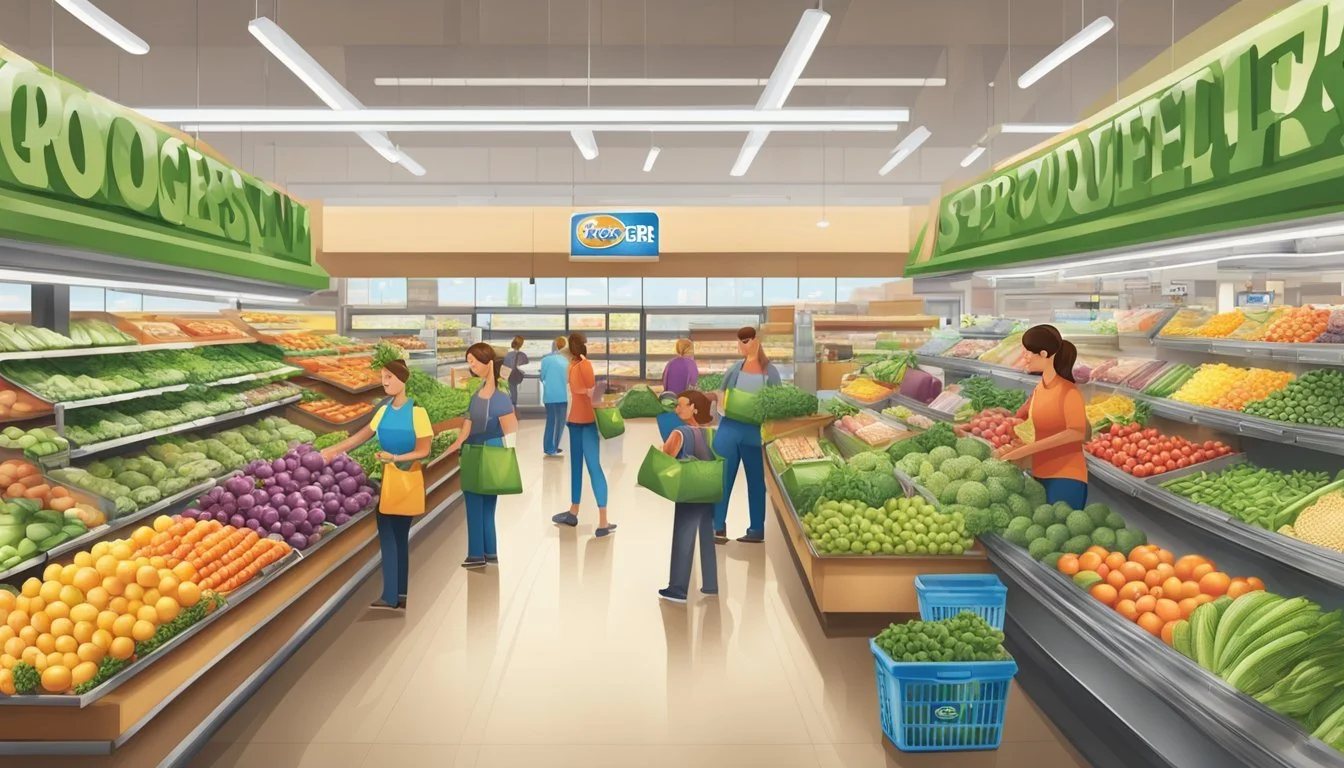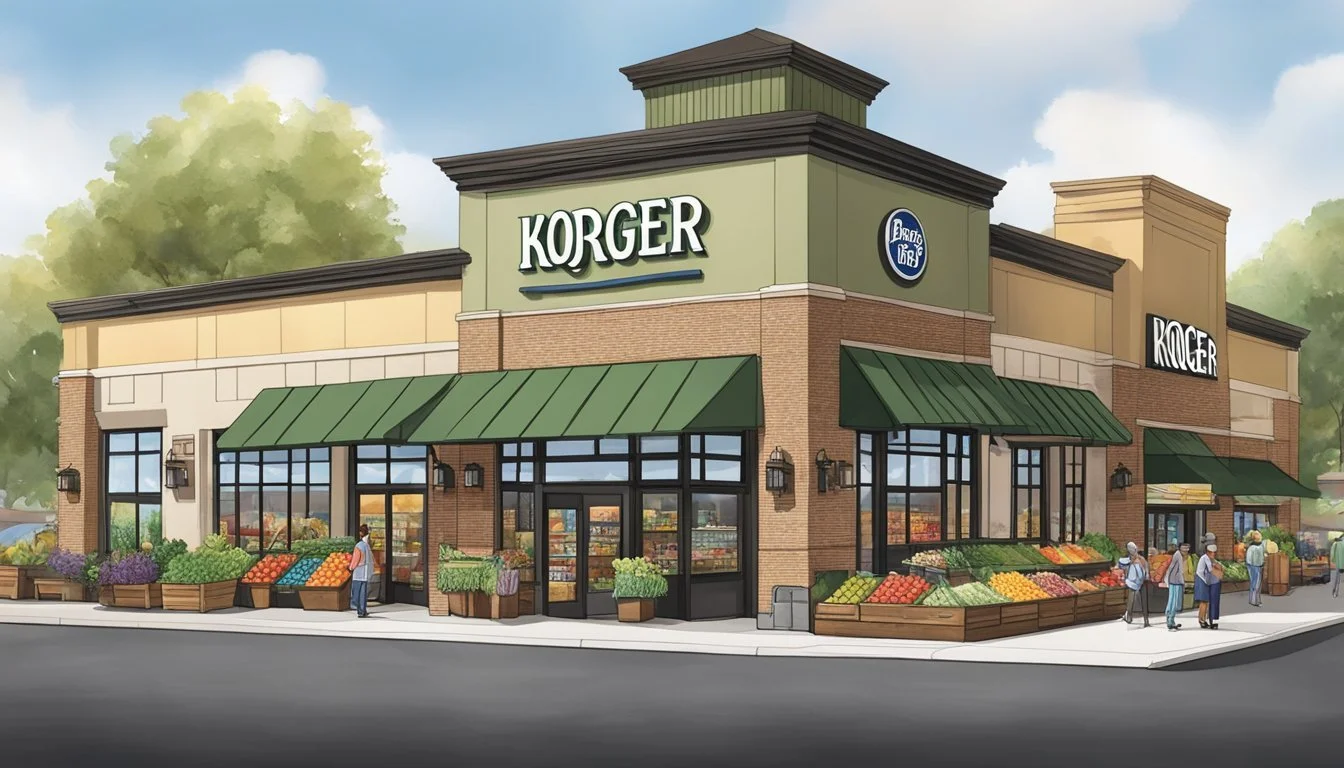Kroger vs Sprouts Farmers Market
A Comprehensive Comparison of Grocery Stores
Part of Our Grocery Store Guide with Details on Kroger and Sprouts Farmers Market
When it comes to grocery shopping, consumers often weigh their options based on a variety of factors including price, quality, and selection. Two prominent players in the American grocery store landscape are Kroger and Sprouts Farmers Market. Kroger, one of the largest supermarket chains in the United States, offers a wide range of products from household goods to fresh produce. Sprouts, on the other hand, has carved out a niche for itself with a focus on fresh, natural, and organic foods, often drawing comparisons to Whole Foods Market, albeit with a reputation for lower prices.
These two chains cater to different shopping preferences and priorities. Kroger boasts a long history since its founding in 1883, growing into a national force with diverse offerings, including store brand products and a strong presence in many communities. Sprouts entered the scene much later, with its first store opening in 2002, but it has quickly established a loyal customer base focused on healthier food options. Both have their own brand value propositions and unique store experiences, compelling shoppers to consider what is most important to them in a grocery store.
Company Overviews
Kroger and Sprouts Farmers Market are two prominent grocery chains with distinct histories and business philosophies. Here is a look at the trajectory of each company's development and their approach to serving the grocery market.
History and Expansion of Kroger
Kroger began its journey in 1883 when Barney Kroger invested his life savings of $372 to open his first grocery store in Cincinnati, Ohio. It has grown exponentially since, becoming one of America's largest supermarket chains. As of 2024, Kroger operates around 2,800 stores in multiple states, with significant footprints in Texas, California, Arizona, Colorado, and Florida. The company's expansion has included a variety of formats, from superstores to price-impact warehouse stores, serving a diverse customer base.
Founding Year: 1883
Number of Stores: ~2,800
Presence: Nationwide, with notable presence in Texas, California, Arizona, Colorado, and Florida
Growth and Philosophy of Sprouts Farmers Market
Sprouts Farmers Market, often referred to simply as Sprouts, was established in 2002 with a single store in Chandler, Arizona. It emphasizes fresh, healthy, and organic products, particularly targeting health-conscious consumers. Sprouts has seen rapid growth, with a portfolio that boasted close to 380 stores by the end of 2023. The retailer focuses largely on fresh produce, bulk foods, vitamins and supplements, packaged groceries, meat and seafood, and deli items. Sprouts maintains its commitment to 'healthy living for less', which has guided its expansion primarily across the Southern and Western states of the U.S., with numerous locations in California, Arizona, Texas, and Florida.
Founding Year: 2002
Number of Stores: ~380
Core Offerings: Fresh produce, bulk foods, health-related products
Philosophy: Commitment to offering affordable, health-conscious products
Market Position and Presence
Kroger and Sprouts Farmers Market serve distinct customer bases with their respective approaches to grocery retail. While Kroger emphasizes wide-ranging services and a broad presence, Sprouts positions itself as a specialist in health-focused foods.
National Footprint and Store Count
Kroger boasts a large national footprint as one of the largest supermarket chains in the United States. It operates numerous stores across the country under various banners. In contrast, Sprouts Farmers Market has a smaller, but growing, presence focused on health-conscious consumers.
Kroger: Over 2,700 stores
Sprouts Farmers Market: Approximately 340 stores
This comparison places Kroger as a dominant grocery store chain alongside competitors like Walmart, Target, and Albertsons. Sprouts, on the other hand, finds its niche among the likes of Whole Foods Market and Trader Joe's.
Local Impact
Locally, Kroger stores, including its subsidiaries like Ralphs and Fred Meyer, serve a wide-ranging demographic with various product lines. These stores often become community staples due to their extensive offerings and customer service. On the local level, Sprouts Farmers Market's impact is seen in its focus on offering organic and natural products, gaining traction with a segment of consumers prioritizing health and wellness.
Kroger: Significant local economic impacts, job creation, community involvement
Sprouts Farmers Market: Community health-and-wellness education, partnerships with local producers
Comparatively, Publix, Aldi, and Wegmans also shape local markets with their own brand positioning, influencing local economies and consumer choices.
Product Range and Quality
When evaluating Kroger and Sprouts Farmers Market, distinct differences emerge in their product offerings and quality, particularly in terms of their organic and natural selections, private label brands, and locally sourced goods.
Organic and Natural Selection
Kroger offers a robust selection of organic and natural foods, including USDA-certified organic fruits and vegetables, catering to consumers who prioritize Non-GMO and organic products. Their Simple Truth brand is developed to provide organic and natural food options, ranging from dairy products to pantry staples.
Sprouts, on the other hand, is recognized for its focus on healthful eating, providing a wide range of natural and organic items. Their store layout emphasizes fresh produce, with an ample selection of organic fruits and veggies. Customers will find meat and seafood options marked with indications of being grass-fed, organic, or sustainably sourced.
Private Label Brands
Kroger’s flagship private label brand, Private Selection, is considered one of the best grocery store brands, particularly for coffee, suggesting their commitment to quality extends across various categories from the bakery section to the dairy aisle.
Sprouts’ private label products align with their health-centered brand, often offering organic or all-natural alternatives that cater to their customer base. While their offerings may be more specialized, they also offer competitiveness in terms of quality in the pantry items and other store sections.
Local and Artisan Goods
Kroger supports local economies by stocking goods from local producers and artisans, with some stores featuring a designated section for these items, which includes everything from freshly-baked artisan bread to locally-produced honey.
Sprouts is also invested in offering local products, which can often be found as part of their seasonal selections. They tend to highlight local produce and goods, thereby supporting regional farmers and producers while providing consumers with fresh, local options.
Pricing and Affordability
Consumers looking to stretch their dollars will find that pricing and affordability are key factors when choosing between Kroger and Sprouts Farmers Market. This section examines the comparative costs of groceries and the savings opportunities available at both stores.
Comparison of Overall Prices
Kroger:
Known for competitive pricing and regular discounts.
Offers a wide range of in-house brands, such as Simple Truth Organics, which is typically priced lower than national brands and comparable in price to Trader Joe's.
Sprouts Farmers Market:
While Sprouts generally markets itself as an affordable option in the natural and organic niche, it often has higher prices compared to Kroger.
Stores like Aldi and Walmart, known for low prices, usually outcompete Sprouts in terms of overall affordability.
Price Comparison Table:
Item Kroger Price Sprouts Price Organic Milk $3.29 $3.49 Free-Range Eggs $2.50 $3.99 Almonds (per lb) $5.99 $6.99
*Prices are for illustrative purposes and may vary by location and over time.
Discount and Loyalty Programs
Kroger:
Offers a loyalty card program where members receive exclusive discounts and digital coupons.
The Kroger App provides personalized offers and $15 off on the first three deliveries, enhancing affordability for online shoppers.
Sprouts Farmers Market:
Sprouts has a deals of the month program and regularly sends out circulars with weekly discounts.
Does not have a specific loyalty card, but does offer digital coupons and discounts through its mobile app.
In conclusion, while both stores offer various ways to save, Kroger often provides more consistent low prices and extensive discount programs, positioning it potentially as a more budget-friendly option than Sprouts Farmers Market, especially for customers who are focused on both organic products and affordability.
Shopping Experience
The shopping experience at a grocery store can significantly affect customer satisfaction, from how stores are laid out to the availability of convenience services. Attention to detail in store layout, customer service, and additional amenities play a pivotal role in making shopping trips efficient and enjoyable.
Store Layout and Navigation
Kroger stores typically feature a consistent layout, helping customers familiarize themselves quickly and navigate aisles with ease. Important departments like the Produce Department are strategically placed for accessibility. In contrast, Sprouts Farmers Market prioritizes an open-market feel, with spacious aisles and a layout that emphasizes their health-focused offerings, such as organic produce and bulk items.
Customer Service
Both grocers are known for their attentive customer service. Kroger employees often assist in finding products and facilitating fast checkouts, while Sprouts' staff are recognized for their knowledge of health-centric products, including dietary-specific items. Sprouts' customer-centric approach adds value for those seeking guidance in selecting healthier food options or specialty products.
Convenience Services
Convenience is a key factor in the modern shopping experience. Kroger has invested heavily in their home delivery and pickup services, partnering with platforms like Instacart to ensure customers have access to grocery shopping from the comfort of their home. Sprouts also offers home delivery via Instacart, alongside features such as juice bars and salad bars in certain locations, providing customers with fresh salad options and healthful drink choices for an enhanced in-store experience.
Health and Diet Considerations
When comparing Kroger and Sprouts Farmers Market, it is important to consider the stores' approaches to supporting healthy lifestyles and their availability of dietary options tailored to various needs.
Dedication to Healthy Lifestyles
Sprouts Farmers Market's core offering is their emphasis on natural and organic foods. They market themselves as a destination for individuals seeking all-natural and USDA Organic produce and products. On the shelves of Sprouts, consumers will typically find a wide array of healthy foods, including organic fruits and vegetables, which are a cornerstone of their brand.
In contrast, Kroger offers a robust selection of health-oriented products as well, particularly through its Simple Truth brand. This line specifically caters to those interested in natural and organic foods, boasting items free from artificial sweeteners and artificial flavors. Kroger has integrated these offerings across their various store sections, making it accessible for customers to find healthy options.
Availability of Dietary Options
Sprouts has built a reputation on catering to specific dietary needs by providing a diverse selection of vitamins and supplements as well as gluten-free, non-GMO, and vegan alternatives. Their focus on specialty diet items is a significant part of their store layout, often meriting its own section that is well-signposted and easy to navigate.
Kroger matches this with its extensive inventory that includes a variety of dietary options. Their stores often feature separate sections for health-conscious customers, including gluten-free and plant-based foods. Furthermore, Kroger has invested in expanding their range of "Free From" products, which are produced without over 101 artificial preservatives and ingredients, ensuring customers have access to foods that align with their wellness objectives.
By maintaining a selection of USDA Organic products and health-centric items, both Sprouts and Kroger show a commitment to facilitating healthier choices for their customers.
Sustainability and Ethical Practices
When choosing where to shop for groceries, the sustainability and ethical practices of a store can weigh heavily on a consumer's decision. Both Kroger and Sprouts Farmers Market have taken clear steps towards environmental sustainability and community involvement.
Environmental Initiatives
Kroger's Environmental Initiatives:
Kroger strives to source raw materials and ingredients that meet stringent specifications for food safety, quality, and sustainability. They emphasize responsible and sustainable production methods for food and consumer goods.
The company reported over 2 trillion personalized recommendations a year, suggesting a focus on a personalized approach to its sustainability efforts.
Sprouts Farmers Market's Environmental Initiatives:
Sprouts is known for investing in the sustainability of their operations, reducing their carbon footprint, and managing natural resource intake thoughtfully.
Their commitment to providing organic and sustainable food choices is a part of their identity, and they have made strides in diverting food from landfills to support those in need.
Community Involvement
Kroger's Community Involvement:
Kroger recognizes its role in fostering a resilient and equitable food system, aiming to preserve access and affordability through community engagement and support.
Sprouts Farmers Market's Community Involvement:
Sprouts has shown a commitment to taking care of local communities by highlighting this dedication in their Environmental, Social, and Governance (ESG) Report, signifying ongoing efforts to support local wellbeing beyond simply providing organic produce.
Both entities offer products for the health-conscious shopper, such as "Simply Nature" and selections from "The Fresh Market", signifying their commitment to fresh and sustainable offerings. "Fresh Food" plays a significant role in both companies, as they continue to implement and advance practices that are environmentally sustainable and community-focused.
Consumer Perceptions and Brand Loyalty
Understanding how customers perceive and show loyalty to Kroger and Sprouts Farmers Market is crucial to discerning which grocery store may hold an edge in the market. This includes an examination of customer feedback and the recognizability of each brand.
Customer Reviews and Ratings
Kroger and Sprouts Farmers Market have distinct reputations that manifest in customer reviews and ratings. Kroger, with a wide-ranging presence, is often highlighted for its convenience and variety. It is not uncommon to see Kroger supermarkets rated favorably for their comprehensive loyalty programs. On the other hand, Sprouts is frequently praised for its focus on fresh, organic produce, and healthy food options. However, consistent with the findings reported by various outlets such as Newsweek, Sprouts has been contending with the challenge of differentiating itself as conventional retailers like Kroger begin offering similar natural and organic products.
Kroger Customer Ratings:
Convenience: High
Product Variety: High
Loyalty Program Satisfaction: High
Sprouts Customer Ratings:
Freshness of Produce: High
Organic Product Assortment: High
Store Experience: Moderate to High
Customers regularly review grocery stores on platforms such as Yelp, Google, and Trustpilot, providing a diverse range of opinions on both Kroger and Sprouts that contribute to the overall perception of the brands.
Brand Recognition
In terms of brand recognition, Kroger stands out due to its longevity and expansive network of stores across the United States. It is often featured on lists like Newsweek's America's Best Loyalty Programs, emphasizing its ability to remain top-of-mind for consumers. Sprouts, while not as ubiquitous as Kroger, has carved out a niche in the market that resonates with health-conscious shoppers, particularly those searching for specialty natural and organic products. Yet, the brand faces competition from larger chains like Amazon, which has entered the grocery sector, and CNBC reports that this has influenced how traditional grocery stores, including Kroger and Sprouts, adapt and position their brand image.
Brand Recognition Factors:
Store Count:
Kroger: Very High
Sprouts: Moderate
Niche Market Presence:
Kroger: Broad
Sprouts: Specialized in Natural and Organic
Mainstream Media Presence:
Kroger: Often featured in media such as CNBC
Sprouts: Less presence, but noted in specific health-oriented discussions
Conclusion
Kroger and Sprouts Farmers Market each cater to different customer needs within the grocery store market. Kroger offers a wider selection of goods at competitive prices, often making it the more convenient option for diverse grocery lists. Its expansive footprint and variety of store brands also contribute to its appeal for one-stop shopping.
Sprouts Farmers Market, on the other hand, specializes in natural and organic products, targeting health-conscious consumers. While their offerings may come at a higher price point compared to Kroger, they focus on quality with an emphasis on wholesome food options.
Price Comparison:
Kroger: Generally provides more cost-effective choices.
Sprouts: Prices tend to be higher, reflecting the specialty health-focused products.
Product Range:
Kroger: Broad spectrum of brands and products.
Sprouts: Curated selection prioritizing natural and organic items.
Target Market:
Kroger: Appeals to a wide demographic seeking value and convenience.
Sprouts: Attracts customers prioritizing health and specialty diets.
Shoppers should consider their personal priorities when choosing between these two retailers. If budget and variety are paramount, Kroger may be the preferred destination. For those prioritizing dietary needs and organic options, Sprouts Farmers Market is likely the better choice. Both stores have their strengths and can be optimal for different shopping needs.











